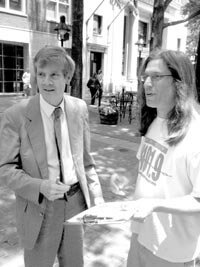Board ballot: Election option up for vote
After a year of upheaval and controversy in the Charlottesville City Schools, the future of the school board will be determined in a referendum on the ballot in the November 8 elections.
At issue: whether to choose the school board by election or appointment. And as in other issues facing the schools, the race card is on the table once again.
"Council has gone out of its way to ensure diversity" in its appointments, says Mayor David Brown, who questions whether "diversity will be maintained" if the city decides to elect school board members
The "concern," Brown explains, is that the process of running for office may be intimidating to many who might otherwise be qualified to be on the school board.
But Republican City Councilor Rob Schilling, who gathered more than 2,000 signatures on a petition to get the referendum on the ballot, says the opposite is true. Many qualified people, he says, don't apply for appointment because they believe they don't have the City Council connections to be chosen.
Appointed school boards, he says, have a "sordid and shameful history," dating back to the early part of the 20th century when Virginia's General Assembly made electing school boards illegal as a way of preventing blacks from serving. In fact, says Schilling, it wasn't until after a group of African Americans filed suit in 1989 that the General Assembly repealed the law. After school board elections became legal in 1992, 78 percent of Virginia's school systems switched from appointments to elections.
Now, he says, it's time for Charlottesville to do the same.
"I really think it's a matter of social justice in addition to good governance that this be changed," says Schilling.
City Councilor Kevin Lynch denies that knowing someone on Council, or being a Democrat, is a requirement for a school board appointment.
"If you don't have much in the way of credentials or experience, then you're unlikely to get appointed," he says, "but I think we're going to take a serious look at any qualified candidates in the appointed system."
Like Brown, Lynch says he's not entirely opposed to an elected board, but he fears "proponents of an elected school board haven't sufficiently thought through how this is going to work beyond the November ballot.
"When we go to an elected system," says Lynch, "the folks who are good are going to need not just accolades, they're going to need money. They're going to need help running a campaign, going around knocking on doors. I think the process itself will tend to exclude some of the diverse population we're looking for."
Schilling says those concerns are not only unfounded but insulting.
"The whole attitude is patronizing," he says. "The majority of city council is saying that they don't believe the city of Charlottesville would elect qualified African American members to school board."
UVA history professor Jeffrey Rossman, a Democrat who worked with Schilling to place the referendum on the ballot, points out that the NAACP has offered a unanimous endorsement, which he hopes "puts to rest the thoughtful concerns that have been raised about the diversity of an elected board."
The bipartisan– and bi-racial– coalition supporting an elected school board is in stark contrast to the racial divide that surrounded the school board's hiring– and subsequent buy-out– of controversial superintendent Scottie Griffin, an African American whose short tenure was marked by bold personnel and program changes.
While NAACP head Rick Turner did not immediately return the Hook's call, Mayor Brown calls the NAACP's endorsement "reassuring." But both he and Lynch say race is only one type of diversity they're worried about losing.
Low-income individuals may be unable to pay the costs of a campaign, which include flyers, signs, advertisements, and time spent canvassing neighborhoods, they say. And parents of young children might also feel unable to take on the time-consuming task.
But Rossman believes there will be no shortage of diverse and qualified candidates. He points out that of the 13 people who offered themselves up during the school board appointment process in June, 12 said they'd be willing to run for the seat in an election.
"In a community like this," Rossman says, "there's interest in public education and in seeing our schools achieve their potential."
Walt Heinecke, an independent and parent of a child in the city schools, says he sees in the elected school board issue a larger shift in Charlottesville from a "paternalistic" style of government, in which a small number of people are responsible for nearly every decision, to one in which citizens play a greater role in running their city. The referendum will not change the fact that Charlottesville will operate with five city councilors and seven school board members.
"I think this is about people wanting to give input," Heinecke says, "and not leaving important decisions about education to 12 people in some smoke-filled back room."
Lynch says that citizen input is crucial in either an appointed or elected system.
"If we don't recruit for diversity, it's going to run toward self-employed white guys with time to do it," he says. "If you have a council or school board of folks who look like me, you're going to miss a lot."

Back in June, Rob Myers couldn't sign a petition because he lives in the county, but unlike the previous five people Rob Schilling (right) beckoned, he stopped to express support for an elected board.
FILE PHOTO BY HAWES SPENCER

Who will join this table?FILE PHOTO BY LAUREN BROOKS